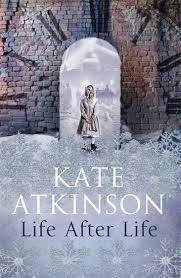 As you will have noticed if you pop in here from time to time, I'm not a great reader of newly published fiction. But of course there are exceptions -- if I admire the author, if the novel sounds intruiging enough, or if it's been recommended by someone whose opinion I admire, I'll go for it. And in this case, all three of the above applied -- I've loved Kate Atkinson's Case Histories, the recommender was Adele Geras, whose opinions generally seem to coincide with mine, and as for the subject -- well, I couldn't resist.
As you will have noticed if you pop in here from time to time, I'm not a great reader of newly published fiction. But of course there are exceptions -- if I admire the author, if the novel sounds intruiging enough, or if it's been recommended by someone whose opinion I admire, I'll go for it. And in this case, all three of the above applied -- I've loved Kate Atkinson's Case Histories, the recommender was Adele Geras, whose opinions generally seem to coincide with mine, and as for the subject -- well, I couldn't resist.
I've heard this described as a novel about reincarnation, and indeed the term is bandied about in the book itself, but it really isn't, or certainly not in the accepted sense of the word. This is not the place for a discussion of the subject, but basically it is a belief that after death the soul or spirit is reborn in a new and different body. Here, though, we have the soul or spirit being born again and again in the same body. The purpose, though, seems to be the same -- hopefully to learn from one's mistakes and do better next time.
Ursula Todd is born on 11 February 1910. This much remains constant, as does her family and background -- comfortable, middle-class, home counties. But over and over again, she fails to progress past her childhood, whether through failing to survive her birth, drowning on the beach, catching Spanish flu, or any one of a number of other disasters. But Ursula, as she grows older, starts to intuit some of the pitfalls and manages to avoid them, only sometimes to fall at the next hurdle. After she has pushed Bridget, the maid, down the stairs to prevent her going to London for the 1918 celebrations of the end of the war, knowing that it is from Bridget that she caught the flu last time around, she is sent to a wise Buddhist psychiatrist who tells her about Nietzsche's theory of amor fati, the acceptance of one's fate, and tries, not very successfully, to explain to her the mechanics of what is happening.
"You are an old soul", he said, "it can't be easy, but your life is still ahead of you -- it must be lived".
But in the end, Ursula has to fight her way through - well, life after life, sometimes happy, more often tragic, until, near the end, she has reached the age of sixty and expires peacefully and naturally in a deckchair in a London park. She has gone through two wars, both in England and in Germany, through two marriages, two pregnancies, the loss of many dear friends and family, but in this, which may or may not be her final life, she has achieved some kind of peace.
There's so much that could be said about this novel. Leaving aside the primary premise, which is certainly fascinating and original -- really so much more interesting than a straightforward exploration of reincarnation -- the historical background is brilliantly done, especially perhaps all the heartrending scenes in 1940s London, where Ursula has chosen to do rescue work on bombsites, but also the details of everyday life in the 1910s, the 1920s, the 1930s. The book also explores family relationships with great sensitivity, among them Ursula's great love for her brother Teddy, who is of all the family the most in tune with her, and who is allowed to speak out loud the underlying premise of the novel:
"What if we had a chance to do it again and again", Teddy said, "until we finally did get it right. Wouldn't that be wonderful?"
So -- here we have a massively experimental and at the same time immensely readable novel, which combines a postmodernist approach with a curious nostalgia for the good old days of middle class English life before the violent changes of the two wars. It even allows for speculation about what would have happened if Hitler had been assassinated before 1939. Something for everyone, then. Do read it, if you haven't already!
